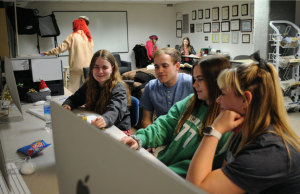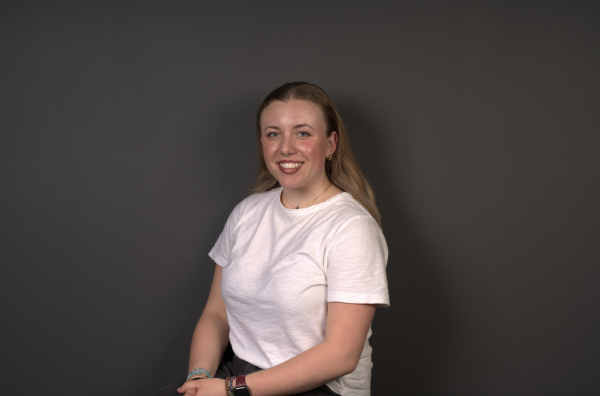A-T challenges UMC interview guidelines
March 30, 2022
A letter to UW Oshkosh Chancellor Andrew Leavitt alleging that the university engaged in a “pattern of silencing the student press by restricting campus voices” has resulted in policy changes that will include University Marketing and Communications (UMC) encouraging staff and faculty to be responsive to the Advance-Titan and its reporting efforts.

The Advance-Titan proposed that the University Marketing and Communications department add a statement that reporters do not have to go through them for interviews.
The letter from the Foundation for Individual Rights in Education (FIRE) was sent to Leavitt after The Advance-Titan published an editorial about student press and included information on UMC requiring The Advance-Titan to schedule interviews through their office, making it difficult for student reporters to get sources to communicate in a timely manner.
The letter sparked controversy over the internet as the story gained traction. Alumni, staff members and journalists reached out to The Advance-Titan with words of encouragement and support, while others contacted Leavitt demanding changes in their procedures..
Cory Sparks, the editor-in-chief of The Advance-Titan, reached out to Leavitt and requested a meeting regarding student press freedom. The meeting was held on March 17.
“Going into the meeting, I felt prepared and ready to make a push on the behalf of The Advance-Titan,” Sparks said. “The staff wanted a change. Many reporters felt they had to jump through various hoops to get a hold of professors [for stories]. We acknowledge that UMC is a valuable asset for helping reporters find experts in a certain field, and we wanted to do everything possible to strengthen the relationship between both parties.”
Sparks had two main concerns:
There is an authority issue and there is a lack of connection between the UMC and the student newspaper.
Many of The Advance-Titan staff are developing writers, and the A-T is their first introduction to journalism. UMC said the interview procedure was a loose guideline; however, many of the staff members took it as a set procedure they must follow.
“Some previous emails UMC sent to past editors were a bit unclear on how reporters were supposed to go about contacting sources for interviews,” said News Editor Katie Pulvermacher. “The emails were worded in a way that suggested reporters were not allowed to directly reach out to faculty and staff to set up interviews. This left much of the staff confused, as this was never the case in years prior.”
Pulvermacher said UMC is not a required mediator for media inquiries with the student newspaper, which was unclear prior to our meeting. “Miscommunication had left both parties confused,” she said.
Both parties agreed that a language change in the emails and communications was needed and UMC said they would work with the student newspaper to make that happen.
Representatives from UMC also suggested that a more open support role would help level the playing field.
Sara Steffes Hansen, the UWO journalism department chair, said: “The conversation was productive toward improving processes and increasing communication and relationship-building between UMC and The A-T staff. I appreciated the respect and openness that was expressed at the meeting.”
UMC’s procedure was put in place two years ago in the midst of the pandemic, and communication has remained minimal since.
Leavitt said he was hoping that UMC would be a helpful channel that would give The A-T more credit with faculty, while also prompting staff to give writers a chance for an interview.
“I hope that we can provide unfettered access to not only student journalists, but all journalists,” he said. “Really, we are here to help facilitate the connections between the outside media and the university. No one’s punished for talking to the press.”
The A-T and university both wanted to repair the damaged relationship.
“Going into the meeting, my hope was we could get to the future and not rehash the past,” Leavitt said. “I acknowledge the past and the problem, but I wanted to focus on what was coming next, and Cory Sparks was on board with that. With my long history with the A-T, I’ve always found the A-T to be fair and accurate.”
Steffes Hansen said: “I went into the meeting hoping that everyone could work together toward solutions and I was pleased to see university and A-T leadership discuss positive and actionable steps forward. I think UWO values student media, press freedom and an informed campus community, and though these can be difficult conversations, they are worthwhile to support those values.”
Winnebago County Human Resources Adviser and Public Information Officer Ron J. Montgomery, chair of The Advance-Titan Advisory Board, attended the meeting and agreed it was productive.
“The good news is that both sides now realize what they should have [known] all along,” he said. “The paper and the administration both have the goal of informing the Titan community. We are all here for the same reason, [and] we’re all Titans.”
Montgomery said what he saw was a misunderstanding of terms, something easily remediable.
“We are lucky to have Chancellor Leavitt who is a very friendly and reasonable person,” he said.
In the end, both UMC and The Advance-Titan agreed to work together as a united front. There are talks of scheduling biweekly meetings between UMC and The Advance-Titan, and while a date has not yet been set, a second meeting between the various stakeholders will be held shortly to further discuss changes and policies.














